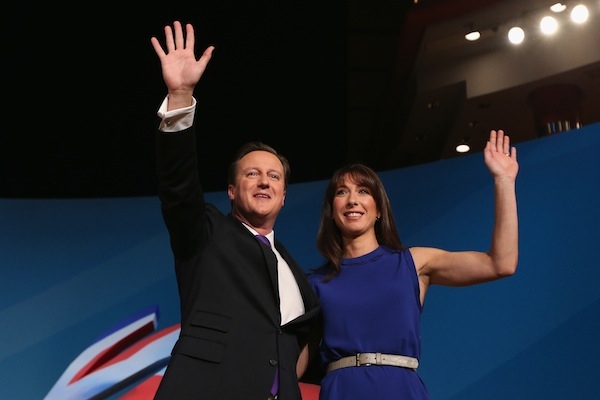This was one of David Cameron’s optimism speeches, a recession-era variant of his ‘let sunshine win the day’. It was pretty short of announcements, which is understandable given the lack of any good news. Instead he focused on essential optimism of the Conservative message: that this is a party which places faith in people, not in governments. And he wanted to spell out what that means, confronting Labour’s criticism of his party (and himself) head-on.
His speech was full of praise for ‘buccaneering’ Britain, a nation whose ability to take on the world was reflected in the Olympic medals table. That there is no problem we can’t solve, if we can persuade the Queen to parachute out of an aircraft to raise a laugh we can do anything. He is quite right, of course, but he didn’t quite say what his government would do to get off the back of the people. And there was no real restatement of the campaigning themes of this government. There is no turning back, Cameron said, no alternative to tough decisions. Quite right, but the criticism of the people in the hall was that his decisions are not tough or radical enough. As we say in the leader of the new Spectator, Cameron’s speech laid out the problems and the overall principles – the fringes were better at spelling out what specific solutions would look like.
His delivery was excellent, as usual: if Ed Miliband had spoken like this, we’d be describing it as a near-miracle. But will this speech be remembered in a year’s time? Or even a month’s time? I doubt it, but I don’t think it was written to be a political landmark. There were sections in it that will be remembered to those who follow politics, especially his moving references to his late son, Ivan.
“When I used to push my son Ivan around in his wheelchair, I always thought that some people saw the wheelchair, not the boy. Today more people would see the boy and not the wheelchair – and that’s because of what happened here this summer.”
Cameron rarely mentions Ivan, which gives such references all the more impact. He spoke movingly about his father’s disability, talking more about his family than he ever has before. But ideology? Political belief? When he said he’s list his own answer to Beveridge’s famous five “giant evils”, I wondered if he was going to outline a creed. But not really: he was against “unfairness” and “injustice”. As are most people in politics.
Of course, conferences speeches are bigger moments for Opposition leaders than Prime Ministers. If Cameron has a major announcement, he’ll make it in the House of Commons. He may not have had Boris’s jokes, but did have Boris’s spirit of optimism. I liked how he used the Boris line to defend his Eton education:
And to all those people who say: he wants children to have the kind of education he had at his posh school I say: yes – you’re absolutely right. I went to a great school and I want every child to have a great education. I’m not here to defend privilege, I’m here to spread it. I had a great education, he said, and I want all children to have one as good as I did.
This is important, because Cameron has hitherto acted almost embarrassed about his schooling whereas Boris was not in the least ashamed. Today, he dealt with it head-on. It was as if Cameron has, finally, worked out that it doesn’t matter: you play the hand you’re dealt. This is a Tory principle, and he had others. He drew a dividing line between Conservatives and Labour:-
We don’t preach about one nation but practise class war. We just get behind people who want to get on in life.
And there as even his own not-so-coded dig at Miliband, the son of a Marxist historian born into leftie aristocracy:-
While the intellectuals of other parties sneer at people who want to get on in life, we here salute you.
He was able to point to reform in welfare and in schools.
That’s my plan – millions of children sent to independent schools. Independent schools, in the state sector. That’s the genuine revolution that’s now underway.
But when he referred to 79 free schools with 100 more to come, you had a sense of how little progress is being made. We need 430 new primary schools to open each year, just to keep pace with population change. A revolution is indeed underway, but it’s moving too slowly. That is what, for me, blunted the impact of the speech.When he says “Growth: fired up” it sounds great, except it’s untrue. “How can the answer be more spending and more borrowing?” he asks. Quite so: but why has he increased both this year?
I’ve heard Cameron give good, nay, inspirational speeches before. But then there’s no follow-up. It’s all forgotten by Christmas – and the significance of the speech is limited to how far it entertained a tiny number people who watched the full thing.
That’s why it sounded, to me, more like a rally speech than a conference speech. But it was none the worse for that. The Conservatives are, after all, a party that badly needs to be rallied. If the activists needed a reminder about why they give up their time and money to help, then Cameron certainly provided it. It was an articulate defence of Conservatism, and an uplifting summary of his personal politics. But a Prime Minister he will be judged on what he does, not what he says. If the actions of his government tie in with the words of his speech then then – and only then – can it be judged to be a success.







Comments